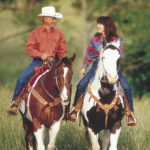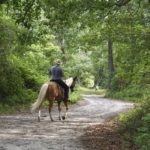The problem of unwanted horses statewide has increased alarmingly over the past few years. ?Tens of thousands of horses end their days unwanted, unneeded or unusable,? according to the Unwanted Horse Coalition (UHC) headquartered in Washington, D.C.

The UHC was formed as a result of the April 2005 Unwanted Horse Summit held in D.C. Organized by the American Association of Equine Practitioners, the summit convened at the same time as the American Horse Council?s annual meeting that year. The UHC now operates under the auspices of the American Horse Council.
The aim of the 2005 summit was to agree on ?the most effective way to work together to address? the issue of unwanted horses in the States.
Definition of Unwanted Horses
The UHC defines an unwanted horse as ?sick, injured, old, unmanageable or dangerous.? Sometimes the owner can no longer afford to care for him, or finds him ?more of a burden than a joy? because he’s doesn’t meet expectations.
Worrying Survey Results
In 2009 the UHC commissioned a survey taken by more than 27,000 horse owners and equine industry stakeholders (vets, breeders, trainers, etc.) who highlighted the problem of unwanted horses.
In 2006 approximately 20% of those responding thought the problem was getting worse. But by 2009 over 80% replied that the number of unwanted horses had ?escalated dramatically.?
The survey quotes respondents? examples of the spread of neglect and abuse, including:
?Starved to death?
?Just left to die without food and water?
?Abandoned?
?Left to starve, abandoned or shot by owners?
Who Is Responsible?
As the UHC states in its flyer ?The Problem of the Unwanted Horse: Own Responsibly? the burden of dealing with this problem lies with all of us, whether individuals or organizations, who are involved in the horse industry.
What Is the Solution?
The coalition?s major goal is to “educate current and future horse owners on how to own responsibly, proper care and breeding, and options available before a horse becomes unwanted.”
Other aims include “raising awareness of the issue and its consequences to horses and the horse industry:” “reducing the number of unwanted horses” and “ensuring that horses are treated humanely and with dignity.”
Funding
The UHC is funded by its member organizations, comprising veterinary, breeder and racing associations as well as specific breed and riding discipline associations, state horse councils and the United States Equestrian Federation.
Donations also come from “caring individuals and groups'” and can be made through the American Horse Council, a non-profit Section 501(c) (6) organization. Contributions may be deductible for federal income tax purposes, but are not deductible as charitable contributions.
Further Information
The Unwanted Horse Coalition is located at:
1616 H Street, NW7th Floor
Washington DC 20006
Tel: 202-296-4031
Fax: 202-296-1970





